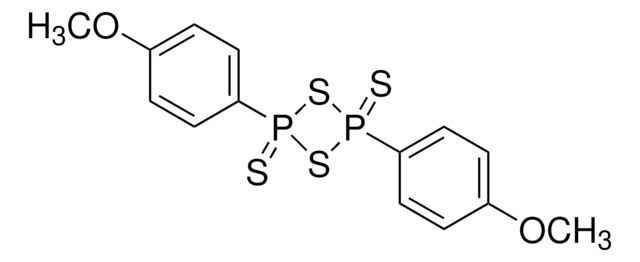207942
Hydrazine monohydrate
N2H4 64-65 %, reagent grade, ≥97%
Synonym(s):
Hydrazinium hydroxide
About This Item
Recommended Products
grade
reagent grade
Quality Level
vapor density
>1 (vs air)
vapor pressure
5 mmHg ( 25 °C)
Assay
≥97%
form
liquid
composition
N2H4, 64-65%
expl. lim.
99.99 %
refractive index
n20/D 1.428 (lit.)
pH
10.6-10.7 (10 g/L)
bp
120.1 °C (lit.)
mp
−51.7 °C (lit.)
density
1.032 g/mL at 25 °C (lit.)
SMILES string
O.NN
InChI
1S/H4N2.H2O/c1-2;/h1-2H2;1H2
InChI key
IKDUDTNKRLTJSI-UHFFFAOYSA-N
Looking for similar products? Visit Product Comparison Guide
Related Categories
General description
Application
Hydrazine monohydrate may be used as a reducing agent for the reduction of:
- Nitroarenes in the presence of hydrogen peroxide functionalized carbon nanotubes.
- 4-Iodo-3-nitroanisole to form 2-iodo-5-methoxyaniline.
- Graphene oxide (GO) to form graphene.
related product
Signal Word
Danger
Hazard Statements
Precautionary Statements
Hazard Classifications
Acute Tox. 2 Inhalation - Acute Tox. 3 Dermal - Acute Tox. 3 Oral - Aquatic Acute 1 - Aquatic Chronic 1 - Carc. 1B - Eye Dam. 1 - Flam. Liq. 3 - Skin Corr. 1B - Skin Sens. 1
Storage Class Code
3 - Flammable liquids
WGK
WGK 3
Flash Point(F)
100.4 °F - closed cup - (anhydrous substance)
Flash Point(C)
38 °C - closed cup - (anhydrous substance)
Personal Protective Equipment
Choose from one of the most recent versions:
Already Own This Product?
Find documentation for the products that you have recently purchased in the Document Library.
Customers Also Viewed
Our team of scientists has experience in all areas of research including Life Science, Material Science, Chemical Synthesis, Chromatography, Analytical and many others.
Contact Technical Service










